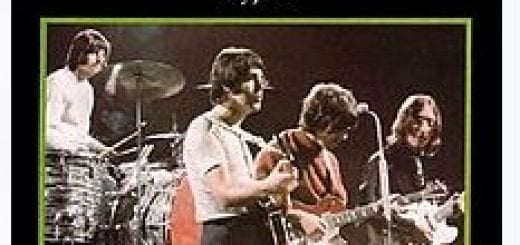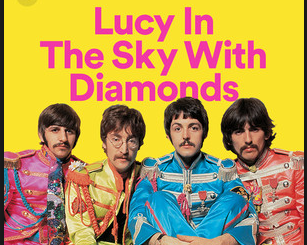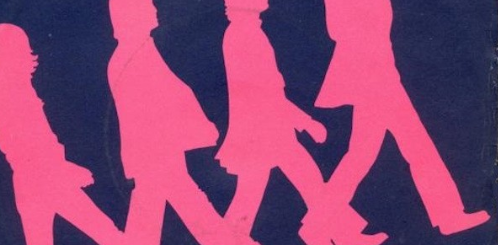“Tomorrow Never Knows” by The Beatles
The Beatles’ “Tomorrow Never Knows” sounds a lot like a rock song you might hear on the radio even today. But music scholars have concluded that such is not only an acoustic quality of this song. In other words, the lyrics themselves, at the time this piece came out, were revolutionary.
In more recent times, spiritually-minded songs with a philosophical undertone that have been further influenced by drugs can be deemed more of a standard than an anomaly. But remember that leading into the 1960s, America was a lot more conservative, one-minded nation than it has become since. As such back in those days even dropping a song about a subject like this was unheard of.
Lyrics of “Tomorrow Never Knows”
The lyrics of this piece have more specifically been referred to as being psychedelic in nature. One of the reasons that description is more applicable is because by the time the song ends, most listeners would likely be hard-pressed to be able to really explain what the vocalist is talking about.
The first two verses make it abundantly clear that the singer is referring to meditation. But by the time the third verse rolls around, things start getting more esoteric. And as the song progresses, its wording not only gets more metaphorical but also increasingly ambiguous. However, to note, “the void” referred to earlier on is actually a reference to Buddhism, which John Lennon was sorta studying at the time.
What has been put forth, concerning those of us who are unable to fully grasp the meaning of this piece, is that a listener has to actually be familiar with hallucinogen drugs, as well some familiarity with the premise behind the doctrine that influenced the lyrics (a book titled The Psychedelic Experience) to fully appreciate what’s being said.
Takeaway
Or as another professional critic has put it, this song actually encapsulates (more so than any other) what it feels like to be on LSD. And to reiterate in listening to it now, as exciting as the piece may be, it doesn’t sound like anything really out of the ordinary. But take yourself back to the early 1960s, at a time when no one ever heard anything like this. Indeed, it can be said that the sixties was the first decade that fully fell into the era of modern music. And it was songs such as this one which helped initiate that movement.
So sometimes, people may wonder why The Beatles are so highly regarded. Well, this track is not even amongst their most-famous songs. But still, it represents one of the reasons why the Fab Four was arguably the most-influential act in pop music history.

When was “Tomorrow Never Knows” released?
Parlophone Records released this track on 5 August 1966 as part of “Revolver”, one of The Beatles’ most-celebrated albums.
This is the closing track on the playlist of “Revolver” though the first song The Beatles began working on for the album.
An earlier version of “Tomorrow Never Knows” can be found on The Beatles’ 1996 compilation project “Anthology 2”. Another, more compact Beatles’ compilation album came out in 2012 which is actually named after this song.
Writing Credits
The primary writer of the song was the late John Lennon (1940-1980). Though as was standard with pieces he authored during the Fab Four era, he shared writing credit with his homey/bandmate at the time, Paul McCartney.
The lyrics of this song were directly inspired by a 1964 text titled The Psychedelic Experience: A Manual Based on the Tibetan Book of the Dead. The primary author of this text was Timothy Leary (1920-1996). Said text, which really enraptured John Lennon earlier in 1966, is on the subject of Buddhism. And it has also been firmly established that at the time, he was taking LSD.
Whose Vocals are “Tomorrow Never Knows”?
Some listeners may be surprised to discover that it is in fact Lennon holding down the vocals on this track. Actually, his voice was altered via a type of specialty device known as a Leslie speaker, a tool which played a prominent role in the 1960s’ (i.e. psychedelic) era of music.
Also, listening to this song now, it may sound ahead of its time for a piece that was dropped in 1966. As such when this piece came out it was considered unorthodox and was also in some ways unlike anything that preceded it.

More Interesting Facts
The producer of “Tomorrow Never Knows” was George Martin (1926-2016). This song also holds the distinction of being the first Beatles’ track in which Geoff Emerick (1945-2018), another name that commonly comes up in studies of the Fab Four, served as the main engineer. And as reported, it was actually his idea that Lennon utilize the Leslie speaker as noted above.
George Harrison played a couple of Indian instruments on this track, most notably the tambura but also the sitar.
This song was covered by Phil Collins in 1981. You can find Phil’s version on his maiden solo album, “Face Value”.
NME, a prominent music publication based in The Beatles homeland of England, ranked this ‘the greatest song’ the Fab Four ever dropped. But that noted, “Tomorrow Never Knows” was not released as a single. It therefore does not have its own chart history to speak of.
Originally, Lennon wanted to incorporate the sound of “thousands of monks chanting” into the background of this track.
You may have noticed that it’s not particularly common to come across Beatles’ songs being utilized in television shows, sampled by other musicians and what have you. Well, part of the reason is because it’s damn expensive to use their music. For instance, the highly-regarded cable show Mad Men decided they just couldn’t do without “Tomorrow Never Knows” for one of their episodes. So in 2012, they paid a whopping quarter-million dollars to license it.
According to George Harrison, this song is in fact about meditation.
Oasis references this song’s title in their 1995 hit “Morning Glory”.








